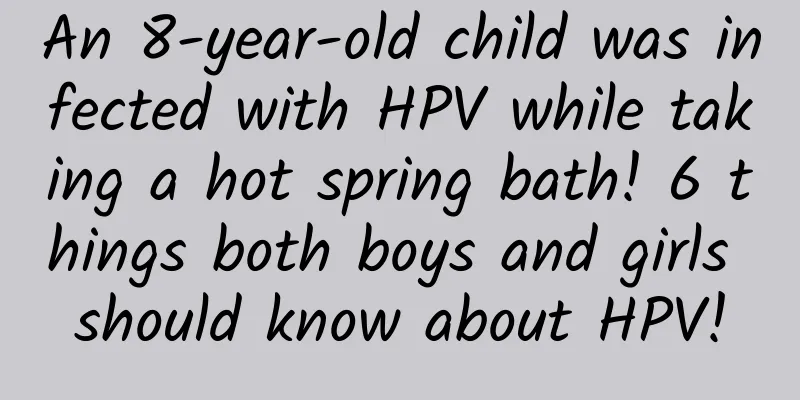An 8-year-old child was infected with HPV while taking a hot spring bath! 6 things both boys and girls should know about HPV!

|
Recently, a piece of news went viral online: an 8-year-old boy suddenly developed some small bumps on his fingers after taking a hot spring bath. After examination, the doctor suspected that he was infected with the HPV virus. This sounds scary. What should we know about HPV? March 4th of each year is International HPV Awareness Day. As we all know, HPV is one of the enemies of women's health. So what exactly is HPV? How does HPV harm women's health? How to prevent HPV infection? Do you really know all of this? Let's talk about HPV together! 1. What is HPV?HPV, the Chinese name for human papillomavirus, is a group of spherical, tiny, non-enveloped circular double-stranded DNA viruses belonging to the genus Papillomavirus. It is epithelial-tropic and mainly causes proliferative lesions of human skin and mucous membranes. Symptoms include common warts, genital warts (condyloma acuminatum), etc. It can live on the skin and mucous membranes, and the infected sites include the mouth, throat, penis skin, vulva, anus, vagina, cervix and rectum. Currently, there are more than 200 known types, which are divided into high-risk and low-risk types according to their carcinogenicity. 2. What are the dangers of HPV?Yang Juan, chief physician of the Fifth Department of Gynecological Tumors at Hunan Cancer Hospital , said that most (99.7%) cervical cancers are related to HPV infection, and the threat of cervical cancer to women's health should not be underestimated. The health of the cervix is very important. The cervix is involved in the process of fertilization, pregnancy and childbirth throughout a woman's life. The 2023 ICO/IARC China HPV and Related Diseases Report shows that in 2020, among women aged 15 to 44 in China, the incidence and mortality rates of cervical cancer ranked third among female tumors. In recent years, the incidence of cervical cancer has been on the rise, and the age of cervical cancer onset has been getting younger. A study on the epidemiology of cervical cancer showed that the youngest age for cervical cancer diagnosis can be as young as 17 years old. A multicenter, population-based study in China showed that the HPV infection rate among Chinese women showed a "bimodal" distribution by age: the first peak was at "17-24 years old" and the second peak was at "40-44 years old" . 3. Why do people get infected with HPV?Sexual activity is the main way to get HPV, but it is not the only way. In addition to sexual transmission, there are also close contact, indirect contact (through contact with the infected person's clothing, daily necessities, utensils, etc.), nosocomial infection (medical staff do not provide adequate protection during treatment and care, causing self-infection or transmitting the virus to patients through medical staff), mother-to-child transmission (through close contact between the baby and the pregnant woman's birth canal). What’s more, HPV infection has almost no symptoms! Many people don’t realize they are infected with HPV and can inadvertently pass the virus on to others. 4. What are the high-risk factors for HPV infection?1. Starting sexual activity too early 2. Multiple or high-risk sexual partners 3. Sexually active 4. Smoking and taking drugs 5. Oral contraceptives 6. Immunodeficiency 7. Not getting regular screening 5. What are the symptoms of HPV infection?Chief Physician Yang Juan reminds us: HPV infection usually does not cause any symptoms. Even in the precancerous lesions and early cervical cancer stages, most women have no symptoms. When low-risk HPV virus can cause noticeable changes, the most common is genital warts, which mostly occur on the foreskin, glans penis, female genitals or near the anus. The typical symptoms of genital warts are light red papules, nipple-shaped, cauliflower-shaped or cockscomb-shaped fleshy growths. 6. How to prevent HPV infection and cervical cancer?HPV vaccination is one of the effective ways to prevent HPV infection! Cervical cancer is a preventable cancer. The 2023 China Comprehensive Prevention and Control Guidelines for Cervical Cancer propose that vaccination with preventive HPV vaccine is the first step in the three-level prevention strategy for cervical cancer! The importance of HPV vaccination for young girls: HPV vaccination for girls of appropriate age before their first sexual intercourse will have a better preventive effect. Importance of HPV vaccination for adult women: The Comprehensive Prevention and Control Guidelines for Cervical Cancer issued by the Women's Health Branch of the Chinese Preventive Medicine Association states: "For women who have already engaged in sexual activity, research experiments have shown that HPV vaccination also has a good protective effect." HPV vaccines are not only effective for women who have never been infected with HPV. Because the vaccine is multivalent, even if you are infected with one HPV type, the vaccine can also prevent lesions caused by infection with other HPV types covered by the vaccine. Currently, all women aged 9-45 can choose the 9/4/2-valent HPV vaccine as needed to protect themselves as early as possible. You can choose the HPV vaccine as needed~
(Edited by YT) |
<<: "Diving" cooling is coming! Experts remind: Beware of this kind of disease
Recommend
How can I get infected and end up in the ICU while driving?
Netizens who follow current affairs news every da...
What are the benefits of taking vitamin E for women?
Our human body needs a variety of vitamins, and t...
What is the reason for the baby's snoring? What should I do if the baby snores?
In the past, few people cared about whether snori...
Is endometrial thickness 15mm serious?
Endometrial thickness is very common. Many female...
Standards for measuring low menstrual flow in 40-year-old women
For example, if a woman is in good health at the ...
What kind of car film is good? Can dark car film pass the annual inspection?
On the one hand, the car film can protect the car...
What are the benefits of eating guava? How to eat guava
Guava is popular among the public for its fresh a...
Is it safe if my child passes the newborn hearing screening?
Author: Xiao Dingliang Hunan Children's Hospi...
What are the symptoms of hyperglycemia during pregnancy
Pregnant women basically know that during pregnan...
Does smoking affect pregnancy?
Whether it is men or women, smoking is very harmf...
When is a female cat usually ready for breeding? Can a female cat be sterilized when she is in estrus?
When cats and dogs grow up, they will have estrus...
Edison: 2017 US Smart Speaker User Survey Report
199IT original compilation Edison released the &q...
How to eliminate postpartum stretch marks
We all know that stretch marks are gradually form...
What’s so magical about the Mediterranean diet, which has topped the list of “best diets” for six consecutive years?
People often ask me: How can we eat healthier? Wh...









